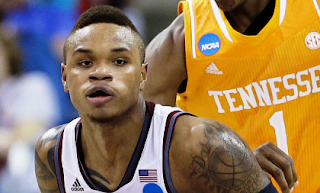Gays just doesn't learn that no team in the National Basketball Association (NBA) will risk hiring them. Because of the possible loss of fan following and company endorsements, team owners are staying away from queer players and nobody can force them otherwise.
Take for instance Derrick Gordon, who broke boundaries in 2014 as the first openly gay player in the NCAA. He told Asbury Park Press, "I didn’t get a fair shot to show what I could do" in the NBA, claiming that "it was without a doubt because of the fact that I'm gay.” He also revealed that he hadn't received a single tryout with an NBA team.
"Nobody was calling," he said. "Even after I went to the (Las Vegas) combine in July, I still didn't get any feedback."
Gordon, who transferred to Seton Hall, became the first openly gay player to participate in the NCAA'S March Madness. He told the paper that he will now pursue a career as a San Francisco firefighter. Good luck with that because just like the NBA, Fire department tend to avoid the queer behavior and the diseases it brought with it.
Gordon previously spoke out about the way that his sexuality has affected his career, saying that he encountered "blatant homophobia" in his attempt to transfer schools. He failed to mention the other side of the coin where players and coaches also encounter "blatant homofascism" as every gay wants to force everyone to accept their despicable sexual fetishes.
Jason Collins became the NBA's first openly gay player ― and the first openly gay male athlete in any of the four major professional sports ― when he came out of the closet in 2013, but he retired from basketball just 19 months later. He was initially hired to find out if the market will follow him and his team. Apparently, that was big marketing blunder because Collins has no basketball talent. Fortunately, teams are now more selective and guarded to avoid the Collins fiasco.
Take for instance Derrick Gordon, who broke boundaries in 2014 as the first openly gay player in the NCAA. He told Asbury Park Press, "I didn’t get a fair shot to show what I could do" in the NBA, claiming that "it was without a doubt because of the fact that I'm gay.” He also revealed that he hadn't received a single tryout with an NBA team.
"Nobody was calling," he said. "Even after I went to the (Las Vegas) combine in July, I still didn't get any feedback."
Gordon, who transferred to Seton Hall, became the first openly gay player to participate in the NCAA'S March Madness. He told the paper that he will now pursue a career as a San Francisco firefighter. Good luck with that because just like the NBA, Fire department tend to avoid the queer behavior and the diseases it brought with it.
Gordon previously spoke out about the way that his sexuality has affected his career, saying that he encountered "blatant homophobia" in his attempt to transfer schools. He failed to mention the other side of the coin where players and coaches also encounter "blatant homofascism" as every gay wants to force everyone to accept their despicable sexual fetishes.
Jason Collins became the NBA's first openly gay player ― and the first openly gay male athlete in any of the four major professional sports ― when he came out of the closet in 2013, but he retired from basketball just 19 months later. He was initially hired to find out if the market will follow him and his team. Apparently, that was big marketing blunder because Collins has no basketball talent. Fortunately, teams are now more selective and guarded to avoid the Collins fiasco.


No comments:
Post a Comment